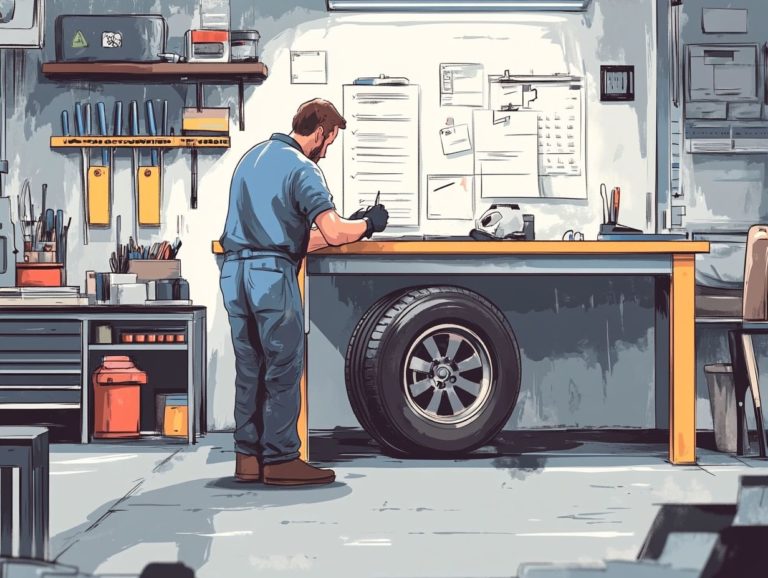Understanding Vehicle History Reports
When you re in the market for a used vehicle, knowledge truly becomes your greatest ally. A Vehicle History Report (VHR) is an important tool that unveils vital information about a car s past, empowering you to make informed decisions.
This guide will walk you through the definition and purpose of VHRs, highlighting the benefits they provide and the steps to obtain one.
You ll discover how to interpret the report, spot potential red flags, and explore alternative methods for researching a vehicle’s history. Get ready to tackle the used car market with confidence and clarity.
Contents
- Key Takeaways:
- What is a Vehicle History Report?
- Why You Should Get a Vehicle History Report
- How to Obtain a Vehicle History Report
- Interpreting a Vehicle History Report
- What to Look for in a Vehicle History Report
- Alternatives to Vehicle History Reports
- Frequently Asked Questions
- What is a Vehicle History Report?
- Why is it important to understand a Vehicle History Report?
- Where can I obtain a Vehicle History Report?
- What information is included in a Vehicle History Report?
- Can a Vehicle History Report be inaccurate?
- Are there any red flags to look out for in a Vehicle History Report?
Key Takeaways:

- A vehicle history report provides valuable information about a used car’s past, including accidents, repairs, and ownership history.
- Getting a vehicle history report is essential when buying a used car, as it can help you avoid potential scams and costly repairs in the future.
- Understanding how to interpret and look for red flags in a vehicle history report is crucial for making an informed decision when purchasing a used car.
What is a Vehicle History Report?
A Vehicle History Report (VHR) is an invaluable resource that offers a thorough account of a vehicle’s past. It encompasses vital details, such as accident history, previous ownership, and service records, giving power to both buyers and sellers to make well-informed decisions in the used car marketplace.
Typically, this report is generated using the vehicle identification number (VIN), which provides access to extensive databases that aggregate crucial data points about the vehicle’s history.
Definition and Purpose
The primary purpose of a Vehicle History Report is to provide you with clear information for buyers and sellers, revealing essential details about a vehicle that facilitate a smoother transaction when dealing with used cars.
This comprehensive report not only helps you grasp the true condition of a vehicle but also plays a crucial role in identifying trustworthy dealerships. You can expect vital information such as accident history, title status, service records, and odometer readings, all of which create a clear picture of the vehicle’s past.
By consulting this report, you can avoid costly mistakes and make informed decisions based on factual data, ensuring that you invest in a reliable automotive option.
Such transparency fosters trust in the transaction, making it easier for sellers to showcase the value and history of their listed vehicles.
Why You Should Get a Vehicle History Report
Acquiring a Vehicle History Report (VHR) is crucial for anyone considering the purchase of a used car. This report offers invaluable insights into the vehicle’s past, illuminating any hidden issues such as open recalls or prior accidents that could significantly influence your purchasing decision.
Making informed choices starts with understanding the complete history of the vehicle you want.
Benefits of Knowing a Vehicle’s History
Understanding a vehicle’s history through a comprehensive report offers you numerous advantages as a potential buyer or seller. It reduces the risk of acquiring a car with a troubling accident history. It informs you about the number of previous owners and allows you to examine the service history all essential elements for making a well-informed transaction.
By exploring these details, you gain valuable insights into the reliability and longevity of a used vehicle. For instance, if a car has been involved in multiple accidents, it could raise safety concerns and lead to ongoing repair costs, which might make you think twice as a cautious buyer.
Knowing the number of previous owners can also provide insights into the car s maintenance habits. A well-cared-for vehicle with only one or two previous owners often suggests a more favorable history compared to one that has changed hands frequently.
A thorough examination of service records reveals consistent maintenance a hallmark of a vehicle in good health. This information not only helps you mitigate risks but also empowers you to make choices that align with your financial and personal needs.
How to Obtain a Vehicle History Report

To obtain a vehicle history report, you can take advantage of online services that offer checks using the vehicle identification number (VIN). Two popular options are Carfax and AutoCheck.
These platforms provide detailed information about a vehicle’s history. This includes accident records, service history, and ownership details.
This helps you make a smart choice before you buy!
Where to Get a Report and What Information is Included
You can easily obtain vehicle history reports from various online platforms. Carfax and AutoCheck are some of the most reputable sources.
These reports provide essential information, including inspection reports, recall notices, and detailed accident histories linked to the vehicle identification number (VIN).
You should also explore resources like the National Motor Vehicle Title Information System (NMVTIS) and your state s DMV website, which can offer valuable insights.
These reports uncover essential details about the car s history, which can be a game changer for your purchasing decision! They typically reveal information about the vehicle’s ownership history, title status, and any reported theft or salvage records.
Recall notices are just as important they alert you to any manufacturer-issued safety alerts, ensuring the vehicle has been serviced properly and supporting your informed purchasing decisions.
Interpreting a Vehicle History Report
Interpreting a vehicle history report demands a keen understanding of its various sections and terminology. This report encapsulates essential information, including accident history and the number of previous owners.
These details can profoundly influence your assessment of a vehicle’s safety and reliability.
Understanding the Different Sections and Terminology
A typical vehicle history report consists of several sections that detail crucial aspects of a vehicle’s background. This includes its accident history, previous owners, and service history.
Each section is vital in painting a comprehensive picture of the vehicle s past. The accident history outlines any reported collisions, helping you gauge potential structural damages.
The report lists previous owners, revealing how many individuals have possessed the vehicle an important indicator of its maintenance and usage level. The service history provides insights into regular maintenance and repairs.
By understanding these terms and the information they convey, you empower yourself to make informed decisions, ultimately enhancing your confidence as a buyer.
What to Look for in a Vehicle History Report
When you review a vehicle history report, it s essential to remain vigilant for specific red flags and warning signs that may signal potential issues.
Look for indicators such as a serious accident history, hidden problems, or open recalls. These factors could significantly impact the vehicle’s performance and overall safety.
Red Flags and Warning Signs

When you delve into a vehicle history report, be on the lookout for significant red flags and warning signs. These include a salvage title, any reported accidents, and lien information.
These factors can raise serious concerns about the reliability and safety of the vehicle. A salvage title means the vehicle was declared a total loss by an insurance company, suggesting potential hidden structural issues that may not be immediately apparent.
Similarly, recorded accidents can foreshadow future mechanical problems, jeopardizing both resale value and your overall driving experience.
Lien information can be particularly troubling, as it may indicate financial difficulties, potentially leaving you responsible for any unpaid debts tied to the vehicle.
Each of these elements can profoundly impact your overall assessment of the vehicle’s worth and its long-term reliability.
Don t skip this step check the vehicle history before you make a decision!
Alternatives to Vehicle History Reports
While Vehicle History Reports are undoubtedly invaluable, you have several alternatives at your disposal for researching a vehicle’s history. Consider conducting a thorough check-up with a trusted mechanic, or look into online forums and community feedback to gather insights.
These methods offer a complete view of the vehicle’s history.
Other Ways to Research a Vehicle’s History
Beyond obtaining a Vehicle History Report, there are several effective ways for you to explore a vehicle’s history. You can seek inspections from trusted mechanics, utilize reputable online resources, and engage with previous owners to gather firsthand accounts.
These interactions can provide invaluable insights into the vehicle’s condition and any potential issues that may not be apparent through documentation alone.
For example, mechanics can provide thorough evaluations, highlighting hidden problems or necessary repairs that could save you significant money down the road.
Tapping into online communities and forums can also reveal common problems associated with specific models. Engaging directly with previous owners often uncovers anecdotes about the vehicle s performance and maintenance history, enriching your understanding of what to expect.
Don’t skip these essential checks before buying your next vehicle!
Frequently Asked Questions
What is a Vehicle History Report?
A Vehicle History Report is a document that provides detailed information about the history of a particular vehicle. It contains important details such as ownership history, accident history, service records, and more.
Why is it important to understand a Vehicle History Report?

Understanding a Vehicle History Report is crucial when purchasing a used car as it can help you make an informed decision. It provides insight into the potential risks and issues associated with the vehicle.
Where can I obtain a Vehicle History Report?
Get your Vehicle History Report today from various sources such as online car marketplaces, dealerships, or independent companies that specialize in providing this service. Some reports may require a fee, while others may be available for free.
What information is included in a Vehicle History Report?
A Vehicle History Report typically includes information about the vehicle’s title, registration, accident history, service and maintenance records, and any reported thefts or recalls. It may also include details about the vehicle’s specifications and features.
Can a Vehicle History Report be inaccurate?
While Vehicle History Reports are usually accurate, there is always a possibility of errors or missing information. It’s important to review the report thoroughly and compare it with other sources before making a decision based on it.
Are there any red flags to look out for in a Vehicle History Report?
Yes, some of the red flags to look out for include multiple owners, a history of major accidents or damages, or a salvage title. These could indicate potential issues with the vehicle and should be carefully considered before making a purchase.






